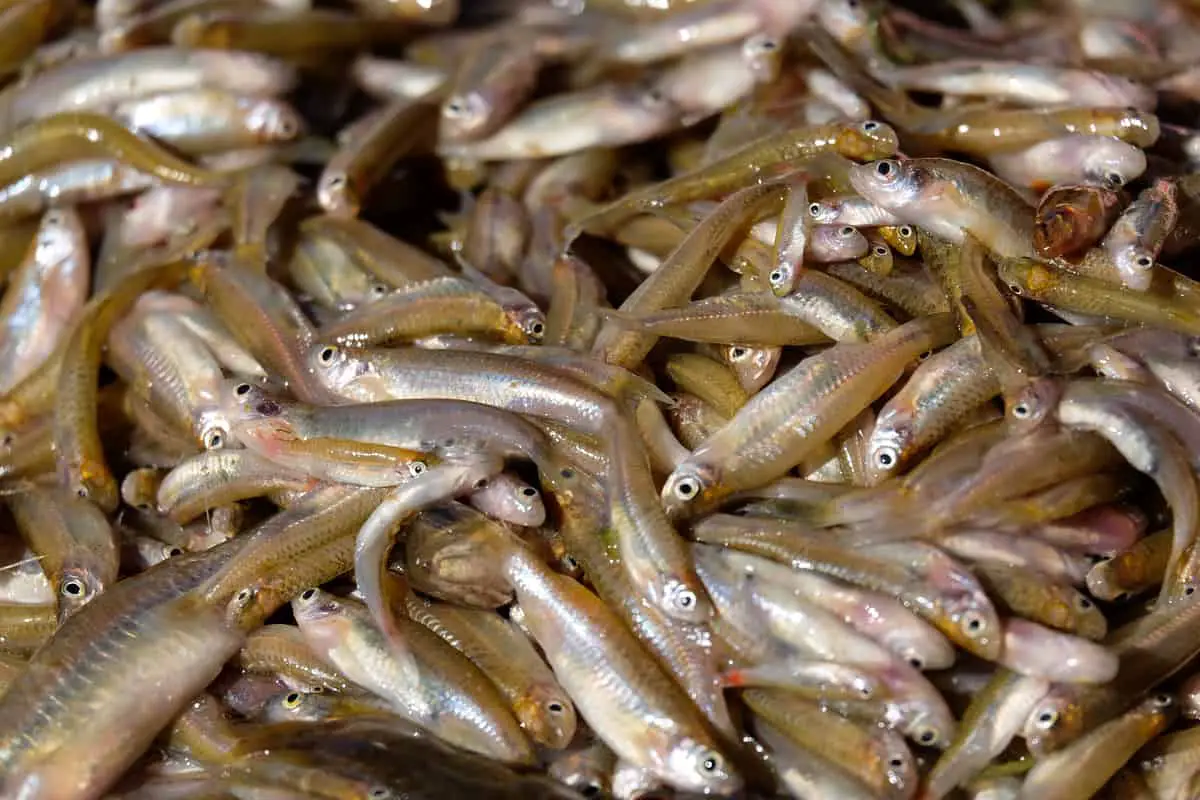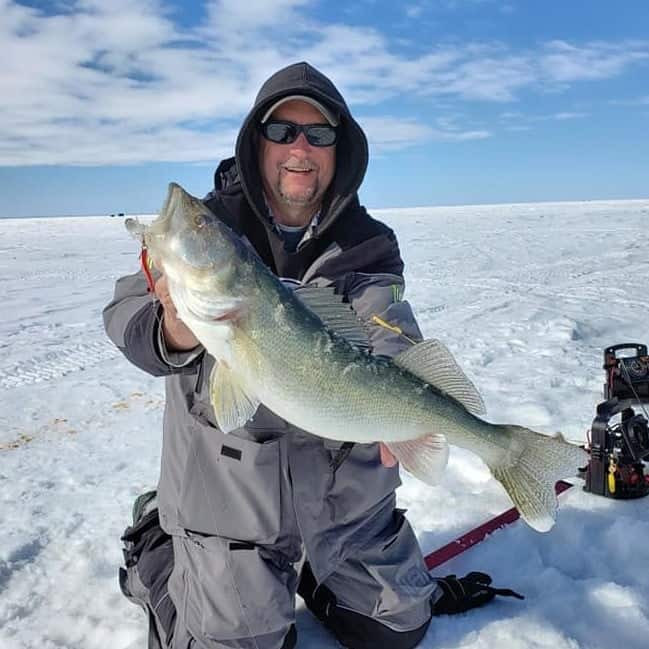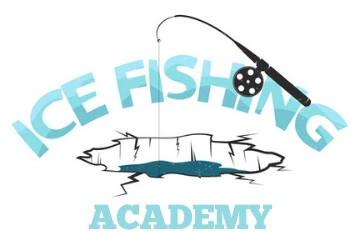Don’t throw away the dead minnows you find floating in your bait bucket when ice fishing! There are times when live bait is unavailable or where you legally can’t use live minnows. So, how can you use your dead minnows for ice fishing?
Dead minnows are effective bait when ice fishing for tipping your jigs, tip-up baits, dead sticking and chumming. Use salt to preserve your dead minnows for use later in the ice season. They are easily cared for, the salt is a fish attractant, and you can hook the whole minnow or just the head.
Every ice fisherman using live minnows always ends up with a number of them dying in the bait bucket. Generally, they are tossed down the hole as they die, but there are better ways to use and store them. I’ll go through them below!
Ice Fishing with Dead Bait – Top Four Techniques!
You may or may not end up with many dead minnows in your minnow bucket, but don’t toss them away or randomly throw one or two down your fishing hole. You’d be wasting a tremendous dead bait for other uses!
Since minnows can be expensive in many areas and challenging to keep lively with lots of action when fishing, there is no sense in wasting them. Save and keep those dead ones!
There are four popular techniques when using dead baits, such as minnows when on the ice. Let’s take a look at them in descending order:
1. Using Dead Minnows for Tipping Jigs and Spoons
The most popular use for dead minnows is when used to tip your ice fishing jigs. Some days the fish will want a little “meat” on the hook to get them to bite!

I don’t know how many times I’ve seen friends grab a live minnow and pinch it in half only to use the head of the minnow! Then they throw the other tail half down the hole!
If you already have a few dead minnows in your bucket, I like to break them in half and use the head section first. The oils in the head and the entrails being open will release a scent into the water better than the tail section.
Pro Tip: Use the eyes from a dead minnow for perch! Scoop the eye out and tip a jig with it. They stay on the hook longer and are tough for the perch to “steal.” Check your local regs on whether they are allowed for use in your area.
Generally speaking, use the tail sections for tipping once you have used the heads off the dead baits. The heads of pinched-off minnows seem to always catch more fish than the tail sections.
Tipping Jigs and Spoons on No Live Bait Lakes with Dead Minnows?
When you get into wilderness areas or in States such as Wyoming, the Game and Fish Department is very wary of invasive species and won’t allow any types of live bait while fishing. You’ll have to use dead baits when ice fishing.
One such lake I have often fished is Lake Winnipeg in Manitoba, Canada, for trophy walleye. On Lake Winnipeg, you cannot fish with live minnows. Are dead minnows effective? Here’s the proof!

Since I don’t want to transport dead minnows across the Canadian border, I purchased them from the Smoke n Fish in Selkirk, MB where we stayed when fishing there.
I recommend them highly for local information, fishing licenses and stamps, current hot jigs and spoons, and for purchasing tubs of salted minnows.
If you want to make your own salted minnows for traveling or for your local lakes, you will find a “Saltie Recipe” for turning your dead minnows into great salted minnows bait at the bottom of this article here on my site.
Tipping jigs and spoons with dead minnows, especially when salted, is a highly productive ice fishing technique.
Want to level up your jigging game? See How to Jig When Ice Fishing to Catch More Fish: 11 Steps! My preferred method to jigging when I first arrive at a lake.
2. Using Dead Minnows for Dead Sticking on the Ice
The “dead sticking” technique is the practice of placing your ice rod over a 5-gallon bucket with your bait hanging motionless in the water below.
Dead sticking is a killer technique for those tight-lipped fish that come in and don’t want to bite. I’ll dead stick a rod next to a hole I’m actively jigging. Fish will come in to look at my bouncing jig and then hit the motionless one!
There are times when an actively swimming minnow will be what the fish want. You can also slow down the action of a live minnow by placing a split shot weight just above it.
But on those days when even lively minnows don’t seem to work, a motionless, dead minnow hanging there will get you those hard-won bites and fish on the pan!
3. Using Dead Minnows for Tip-ups
Although dead sticking is a great fishing technique, you need to be next to the rod when a fish bites to keep it from being pulled down into your hole! I know, I’ve had it happen!
Using tip-ups, you can spread your baits across a wide area, and when a fish hits, a flag pops up, and the tip-up will allow the line to spool off as the fish makes its initial run.
With tip-ups, you have time to get to the line and play the fish.
Most states in the US require you to possibly have your name and address on each tip-up. Some states, like Montana, may allow you to leave your tip-ups unattended overnight too.
Check your local fishing regulations to be sure!
4. Using Dead Minnows for Chumming When Ice Fishing
Again, you’ll want to check your local lake restrictions and regulations on chumming your fishing waters before using this technique.
As I stated earlier, many fishermen will toss a dead minnow or two down the hole when fishing. I believe this to be a waste of a good, and often pricey, bait resource!
By collecting and preserving your dead minnows in sandwich-sized ziplock baggies, you’ll get more bang for your buck when chumming.
One or two minnows floating down the hole won’t draw much attention nor will they put a lot of scent out into the water.
But when you toss a handful or two of minnows down your fishing hole, a lot of scent gets dispersed in the water! Plus, all the flickering is sure to draw nearby fish in!
3 Tips for Improving Dead Minnows for Ice Fishing
You could freeze or salt your saved minnows with the Saltie Recipe I linked to and do fine. But you know how us fishermen are! We need to tinker, customize and improve baits when we can, right?
You can improve fishing with dead minnows by doing the following
- Make a small incision in the belly of frozen minnows; this is because the incision will release more of the minnow’s scent for other fish. It will also burst any air bubbles that might cause it to float.
- Add oils to coat and make the scent of dead minnows stronger. Adding oils creates an improved scent for attracting fish while further disguising that the minnows being used are not alive and kicking. You can use garlic or anise-scented oils too!
- Color the dead minnows with food coloring. Dead minnows often lose their color and flickering shine, causing them to be unappealing to fish. Therefore, you can also add food coloring to a bag of dead minnows. It is recommended that bright colors such as reds, yellows, greens, and whites be used.
Conclusion
While it may seem like dead minnows do not serve any further bait options for fishermen, as can be seen above, with some storage tips and ingenuity, dead minnows remain a viable bait solution for ice fishing.
Have fun and stay safe out there!

